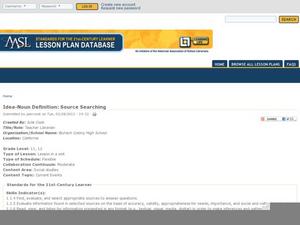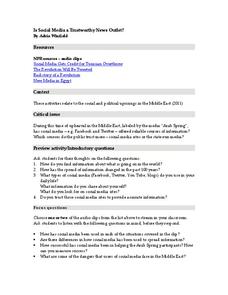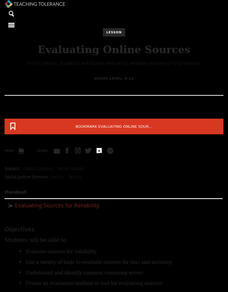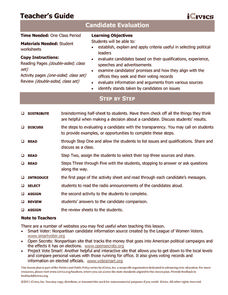K20 LEARN
Street Cred: Evaluating Sources
A lesson on evaluating sources of information teaches scholars to "think twice" before using a source. Researchers examine a resource's home page, author, and sponsor, as well as the date published and the documentation provided.
Curated OER
Who is the Expert? Exploring Credible Sources in Healthcare
How do you decide what sources are credible when researching online? Evaluate sources with a focus on researching health issues. After brainstorming common health concerns and how they would try to diagnose these problems, class members...
Curated OER
Credible Sources on the Internet: What to Trust, What to Dismiss and When to Cite a Source
Wait, you mean researchers don't all use Wikipedia? Teach your class about intelligent research with a lesson about evaluating digital sources. The lesson starts with a quickwrite and includes vocabulary exercises and several...
Curated OER
Idea-Noun Definition: Source Searching
A great idea for showing language arts pupils the universality of themes, even in the real world! Have class members choose an idea-noun (peace, justice, war, love, etc.) at the beginning of the year or semester. They complete weekly...
EngageNY
Gathering Information about Water Management: Assessing and Reading Internet Sources, Day 1
It takes time to discover what makes a source accurate and credible. Using everything they've learned about source credibility, scholars begin researching supporting questions about how industry and agriculture manage water. They select...
Southern Poverty Law Center
Evaluating Online Sources
All sources are pretty much the same, right? If this is how your class views the sources they use for writing or research projects, present them with a media literacy lesson on smart source evaluation. Groups examine several articles,...
Curated OER
How to Locate and Evaluate Information, Part I - Online Catalog
Using the online catalog, researchers locate and record on a citation template specific sources for their research paper. A library specialist models searching strategies while the teacher introduces the research paper process. Daily...
Curated OER
Is Social Media a Trustworthy News Outlet?
Examine the role of social media in social and political uprisings. Pupils listen to NPR audio clips about social media and the Arab Spring and read an article that proposes the idea that revolution will not happen through social media....
Newseum
Putting the Consumer's Questions to Work
Who, what, when, where, why, and how are good questions to ask when evaluating a source. First, scholars find two sources of information relating to a chosen topic. Next, pupils complete a worksheet to gauge the source's credibility....
EngageNY
Using Search Terms for Further Research: Industrial Organic Food Chain
Class members conduct independent research to continue examining the consequences of the industrial organic food chain from Michael Pollan's The Omnivore's Dilemma. Pupils learn about source credibility and effective search terms, then...
Newseum
Can I Trust the Creators?
It's easy to find information at the click of a mouse, but is it trustworthy? Pupils learn about the E.S.C.A.P.E. acronym for evaluating sources. Next, learners read a news story and evaluate its sources to determine credibility. Last,...
EngageNY
Gathering Information about Water Management: Assessing and Reading Internet Sources, Day 2
Accuracy, credibility, timeliness ... it's time to act on source reliability! Pupils continue conducting Internet research, selecting two questions about water management from their researcher's notebooks that they want to explore...
EngageNY
Gathering Information about Screen Time: Assessing and Reading Internet Sources, Day 1
What's the best way to evaluate a source's accuracy and credibility? Pupils discuss the question with a partner and then share their ideas with the class. They also conduct Internet research, looking for an article that answers a chosen...
Curated OER
Hamlet Research Paper: Find, Evaluate, and Select Appropriate Research Sources
Help young researchers find credible sources online. Modeling with a Google search for information about Shakespeare’s Macbeth, use a computer projector or Smart Board to show class members how weak the top three search results are....
Teaching Tolerance
Evaluating Online Sources
Newspapers, television, social media ... how do people get their news? Using the informative resource, scholars locate and verify credible sources of information. Working in small groups, they discuss strategies for evaluating the...
Curated OER
Savvy Surfers: Website Evaluation and Media Literacy
Sixth graders strengthen their understanding of what a high quality website is composed of. Learners evaluate three websites for accuracy, credibility, and reliability by completing a chart.
Curated OER
CCC: Credible sources, Creative Commons Images, and Citing Your Sources
As part of a unit devoted to the study of autobiographies, this one-day library session focuses on developing research skills. Class members locate and properly cite a sketch of a Creative Commons image, as well as record the call...
EngageNY
Applying Research Skills: “Rachel Carson: Environmentalist and Writer”
It's important to cite sources! Scholars take a closer look at their research about DDT by examining how to cite sources. Learners take turns sharing information that would be used to cite sources to complement Rachel Carson:...
iCivics
Candidate Evaluation
How can we decide between candidates on election day? After contemplating various issues and qualities, your learners will go through a step-by-step process of researching and evaluating sample candidates and determining their...
EngageNY
Grade 9 ELA Module 3, Unit 2, Lesson 4
It seems like the first result in a search engine is the best source, but how can you be sure? An activity on assessing sources guides ninth graders through an integral part of their inquiry-based research project, based on questions...
Curated OER
Rainforest/Informational Web Sites that are Credible
Fifth graders evaluate whether various rainforest websites are credible and can be used for research purposes. They listen to the story "The Great Kapok Tree," discuss what makes a website credible, and examine and evaluate various...
Google
Beginner & Intermediate 5: Evaluating Credibility of Sources
Convey how to determine appropriate and credible online sources with a series of three lessons. After completing the lessons, class members will know what kinds of sources to use, how to identify credible sources, and how tone and style...
Google
Advanced 5: Evaluating Credibility of Sources
How do discerning readers determine bias and credibility? Ask small groups to figure it out! First, each group is provided with either articles or videos that contain bias. They examine the resources, respond to included questions, and...
Newseum
Covering a Catastrophe: Evaluating Disaster News
Young journalists investigate the various ways to share news about a disaster and evaluate the pros and cons of each of these types of news. Individuals then select two different forms of media reports of a recent disaster. Using the...

























